Complete Guide to Budget Planning for Construction Projects
Success in construction business requires the effort, time, and energy of the company owner and his or her constituents—ergo, the right business plans, marketing strategies, and technologies. But most importantly, having a well-prepared and efficient budgeting plan will keep the business from meeting dangerous waters and sinking in them.
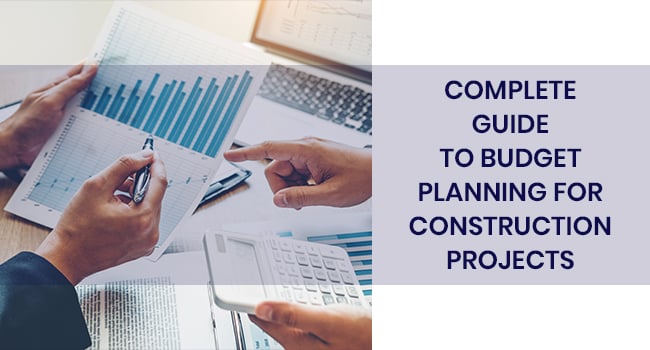
Complete Guide to Budget Planning for Construction Projects
A budget plan is one of the essential tools that entrepreneurs need to use when starting a construction business. This article will provide a complete and comprehensive guide to the processes and methods of budget planning for different construction projects. Read through and supplement yourself with the right information.
Construction Phases of the Budget Planning Process
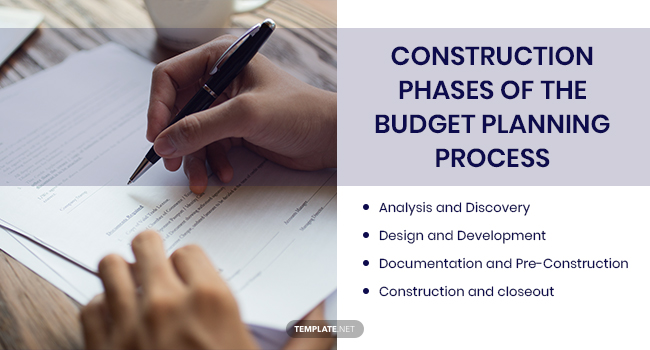
Residential construction, commercial construction, and government construction have one thing in common—they require sufficient budget plans and effective business plans. Designers, engineers, and planners create the desired structure and then provide an estimate for the overall cost of the construction process. Or the method takes a different turn, and the company offers the blueprint of the establishment to build. Nevertheless, there are various funding options that businesses and construction companies can take to acquire the capital for the project. But before sending letters or contacting investors, the business must follow the phases of budget planning to have better results.
Analysis and Discovery
- Being more informed about the current financial status of the company establishes where the budget plan stands. Knowing the company’s structure and financial capacity will make the budget planning easier as construction projects tend to be expensive. The budget team creates a swot analysis and site analysis to determine the funds needed for the project. As a whole, doing research is vital for this section.
Design and Development
- After reading through and analyzing the building development swot analysis and design phase plan, project managers can consult other architects and designers for different opinions. If the hired experienced engineer suggests some modifications to the design or the materials to use, managers can either accept or reject it. When everything is complete, the team can finalize the allotted budget and construction timeline of the project.
Documentation and Pre-construction
- Upon securing the final document, prepare for the commencement of the project. For the preconstruction services and the preconstruction contract, project managers should schedule a meeting with the people involved to inform them about changes or improvements in the plan. When finished with that, the team should obtain documentation trackers to follow the progress of the project.
Construction and Closeout
- When it comes to construction projects, the actual building of the establishment takes up most of the time. Some structures take many months or several years to complete, and project managers should monitor the progress they have to check the cost plans for adjustments. Besides the cost estimate, they should realign plans when emergencies happen. And in nearing the complete or closeout, the team check for unfinished tasks to include in punch lists.
What to Include in Budget Planning for Construction Project
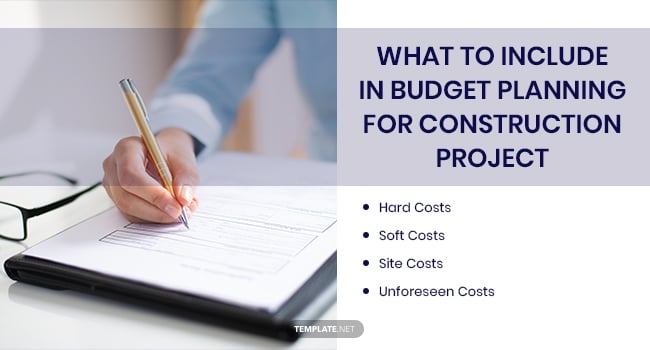
Budget planning for a construction project goes beyond the calculations of the materials to use for the construction of skyscrapers, parks, bridges, or residential houses. The process itself involves other elements such as the funds for professional fees and the wages of employees and payment for the services of subcontractors. For project managers to determine where resources go, they have to categorize the type of costs that the project will face. Through this process, they will divide the budget accordingly, and based on the needs of the project. If there should be changes, then alterations can take place.
Hard Costs
- Hard costs are tangible expenses that project managers can easily measure and estimate. With that, the building materials such as cement, gravel, wirings, and glass are under hard costs. Any supply that becomes part of the infrastructure or property is a hard cost. Beforehand, project managers look at the list of hard expenses together with an equipment cost analysis to come up with a time and material contract for the project.
Soft Costs
- On the other hand, soft costs are intangible expenses that do not directly reflect the construction process of the project. Sometimes, these costs arrive after the construction of the establishment is complete. Some examples of soft costs are permits, insurance fees, system check payments. When engineers check the building through inspection checklists, they can ask for the maintenance, and it falls under soft costs. Construction and engineering business plans can discuss soft costs or not, depending on the preference of the parties.
Site Costs
- Site costs cover the construction expenses that come with purchasing the land. A site phase plan also includes the requirements to acquire the piece of property, such as the building permits and jurisdiction fees. Before construction, there is a soil test to warranty the safety of the building. If necessary, construction companies can also pay environmental fees. A site inspection is a crucial step to knowing the security of the place.
Unforeseen Costs
- Despite being careful, some unanticipated circumstances may occur during the construction of the building or establishment. These unforeseen costs, usually in the form of hazards, calamities, and damaged goods, can disrupt the flow of work and be a burden to the limited budget. So, project managers prepare ahead of time and create a separate budget for those possibilities.
Why is Construction Budget Important?
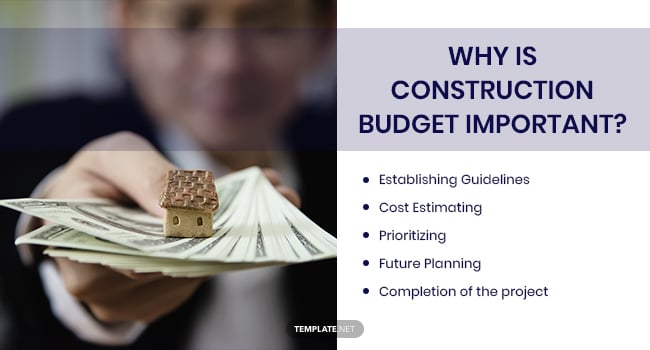
With every investment, businesses expect returns in forms of sales and revenues. The development of high-rise buildings, better bridges and roads, and safer suburban localities is a form of investment for companies, and each has a designated budget. Companies do not give away their hard-earned money for projects that are unstable and suspicious. Even large enterprises with more resources place limitations on the budget for investments as there are other projects to oversee. As a whole, a well-defined and fixed sum on the budget plan is more appropriate for the approval of the organization’s accounting office.
Establishing Guidelines
- When the project manager and his or her team have a better grasp of the numbers, they can establish the guidelines or floor plan to organize the flow of work in the construction site. Having a well-detailed instruction guide or a budget plan is essential for tracking the progress of the project. Logistics and safety measures are also related to a project’s budget plan.
Cost Estimating
- By utilizing a construction budget plan, project managers can calculate cash flow estimate more accurately. Estimating for building cost is better when there’s some form of restriction on the funding—a definite expense estimate. Through this approximation, the team can add or deduct some things in the plan. Do note that cost estimating mostly considers the tangible expenditures of the project.
Prioritizing
- A construction budget helps project managers, engineers, and supervisors in determining what to prioritize. Some parts of the infrastructure have more significance than others, and builders can see that through building cost analysis. By giving priority to other things, the arrival of materials schedule and risk management plans can have its modifications.
Future Planning
- Like every other project that a company undertakes, the future plans and goals are part of the equation. By looking at the construction cost analysis, the owner and builders can figure out how to regain the investment, whether by a staggering process of receiving revenues or another method. A construction action plan also emerges from the completion of budget plans.
Completion of the Project
- The accomplishment of the construction project mostly depends on many factors. One major element that has an impact on the completion of the building or residence is the budget. Without sufficient funds, no project will rise. But when the project nears an end, the project manager and owner create a completion statement. Later on, project records and cost tracking documents become proof of budget planning.
Common Causes of Cost Overruns in Construction Projects
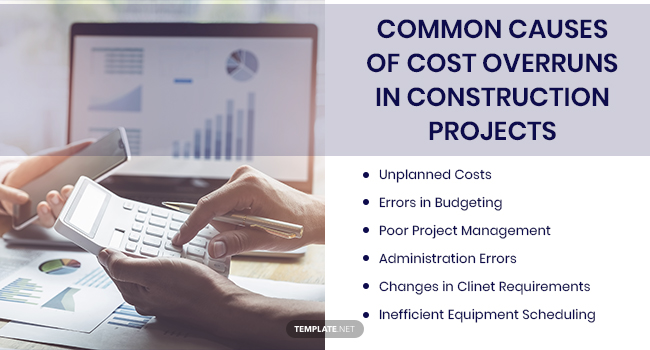
Companies encounter risks while running a construction business. To make amends, these enterprises implement safety practices and plans. Unfortunately, there are times when project engineers, architects, and managers overestimate or underestimate some things in the construction project. An illustration would be the lapses with the number of building materials like cement, metal, bricks, and rocks. Or sometimes the security of the workers. The tiny, often negligent in nature, things can cause overruns or excess on the proposed budget. So, here are the most common examples of overruns that some, if not all, construction projects experience.
Unplanned Costs
- The primary purpose of construction bid estimates is to have a precise numerical value of the whole project’s costs. Raw materials and the wages for the employees are part of the project cost estimate. However, interventions are possible from the signing of the contract to the completion of the project. With that, unplanned costs such as more equipment rentals or legal fees can happen.
Errors in Budgeting/Estimating A Construction Project
- No matter how well the cost management plan is, there will be times when the calculations don’t match the required amount. So, it’s either too many resources or too few. Therefore, the people involved in the construction business should utilize project analysis documents and commercial construction cost estimates to get the right numbers. As always, be careful with inputting the digits.
Poor Project Management
- Without a skilled and experienced leader, a construction project will meet several backlogs and productivity problems. An inefficient supervisor and project management process will only slow the progress of the project, which is not the objective of the owner or the construction company. Consequently, companies dodge the dilemma by hiring a competent project management team. They will create an effective project management timeline to follow the improvements of the project.
Administration Errors
- It may sound uncommon for some, but administration mistakes can cause overruns in construction projects. Miscommunication from the head office, neglecting the needs of the project leaders and employees, carelessness on the safety measures, and no planning methods can delay the project. These errors can lead to insubordination, which causes more problems in the future.
Changes in Client Requirements
- Although rare in some occasions, sudden changes in the client and consultant agreement lead to chaos in the construction of the project. When the owner makes revisions that were not on the client meeting minutes, it will generate alterations with the budget and timeframe. Even small additions on the windows or flooring can be detrimental to the project. So, always ask the client about amendments before breaking ground.
Inefficient Equipment Scheduling
- There are construction materials that are available in a limited time. Due to this, some suppliers deliver the goods even when it’s not needed by the construction site yet. At other times, wrong input with the dates can cause difficulties with deliveries, especially when the project requires it the most. Project managers have to accurately state correct dates in the equipment lease proposal to avoid delays. Furthermore, the parties should follow the equipment contract.
Tips for Budget Planning
The construction company budget is not a bottomless wallet, it has an extent. Whether it’s a commercial construction budget or residential suburban construction budget, companies have specific construction funding for these things. In making sure that budget planning goes well with the project, builders should take in some tips.
- Construction companies or project managers should make schedules for the start of construction, the delivery of the materials, and when to submit progress reports.
- The budget planners have to use new technologies to reduce errors and eliminate the possibilities of reworking some places in the construction process. Moreover, completing other tasks is easier with better technology.
- The companies should avoid overestimating and underestimating the costs of the expense budget for the construction of the establishment. Being too confident with the digits can lead to inaccuracies and confusion.
- Contractors and subcontractors must prepare for the worst possible scenarios in the construction site. The arrival of hurricanes or blizzards causes interruptions, so the project manager has to consider these things. They have to create contingency plans to weather the changes.
- The people in the business should choose the communication tools to utilize in the construction site. There are various devices that the people in the construction site can use that fit the budget plan.
Conclusion
A firm without a definite and detailed plan will eventually crash and burn in the long run. To be ahead of competitors, companies should prioritize formulating better plans—budget plans, business plans, and marketing strategy plans—and utilizing new devices and types of machinery. More than ever, they have to realize the importance of technology to the improvement of the business. For construction companies, getting tools such as daily reporting sheets, assessment sheets, and progress reports are tools that companies need for the success of construction projects. In conclusion, it’s always better to draw up plans for activities and events.






